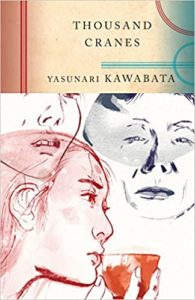Thousand Cranes
Yasunari Kawabata
Kikuji is on the way to a tea ceremony held by Chikako, who had been his father’s mistress. Over the years, he had received many invitations from her, but since his father’s death, this is the first one he accepts. At the ceremony, he meets Mrs. Ota, who is the total opposite of Chikako, and Kikuji falls for her immediately, just as his father once did. From then on, Kikuji finds himself at the centre of Chikako’s intrigues, and although he is not a born fighter, it is not clear yet who will get the upper hand in the end.
I couldn’t help but feel sorry for poor Kikuji who is torn apart by his feelings for no less than four women: meddlesome old crone Chikako who wants to see him married to Miss Inamura, a nice girl and protégé of hers, and the attractive and still young-at-heart Mrs. Ota and her daughter Fumiko, who doesn’t quite know how to deal with her mother’s strange attraction to Kikuji – or her own.
Yasunari Kawabata (1899 – 1972), was born in Osaka into a wealthy family, but was raised by his grandfather after he was orphaned. From a young age, he showed talent – and was interested in – both painting and writing, but he eventually turned to writing and published his first stories when still in high school. After graduating from university, Kawabata quickly became one of the most important modern Japanese writers. After WWII, his fame spread internationally, and in 1968 he became the first Japanese to win the Nobel Prize for Literature.
If you’re up for something melancholy and short, try this one – it’s available on amazon.

